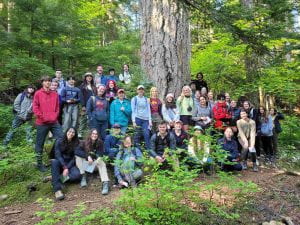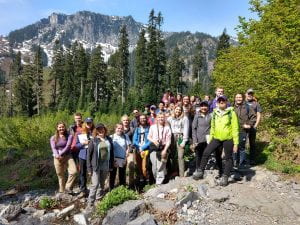Pacific Northwest Ecosystems – Spring 2026 by Professor Sharon L. Doty
TA: Morgan Raimondo
Lab/Field Trip Assistants:
Lectures on Tuesdays at 8:30-9:50 AM in ECE 105
Doty-led Lab Section: Wednesdays 8:30-11:20AM
TA-led Lab Section: Thursdays 12:30-3:30 PM
Course Introduction: This course will introduce you to the principles of ecology across an urban to wild land gradient and across the west to east gradient over the Cascades Mountain Range. Students will be exposed to basic ecological theory and northwest plant communities as well as to the interaction of plants, soil, soil organisms, climate, hydrology, fire, insects and diseases on the landscape.
Course Grading
Grades are based according to the UW Standard Scale
Examinations (including plant identification by samples): Midterm (27%) and Final (30%)
Participation in the field trips and labs is mandatory
1. Species Fact sheet (written and orally presented): 5%
2. Quizzes: 10%
3. Lab write-ups: 28%
Learning Objectives
- Describe the climatic and physical features of the Pacific Northwest that lead to our unique ecosystems
- Assess the challenges of specific environments across the coastal to mountain to semi-arid gradient as well as across the urban to wildland gradient
- Develop observational skills to be able to identify key plant species and, with the knowledge of their niche and adaptations, determine in which environment the species belongs
- Recognize the importance of each level of the trophic pyramid to ecosystem function and the factors that influence each level
- Understand ecological restoration in the context of the principles of succession and niches
- Independently research a species, write an informative yet concise report, and be able to orally present the research to the class
- Recognize the interactions of plants, animals, soils, and microorganisms for ecosystem function
- Assess the influences of abiotic and biotic disturbances on ecosystems and be able to differentiate normal and abnormal levels
- Be able to define the ecosystem type, predict the environmental responses, and discuss possible management options for sustainability
Course Syllabus 2024 Course Syllabus: Lectures on Tuesdays; labs on W, Th, or F
Mar 26 Intro to Pacific NW ecosystems and the urban-rural gradient and west-to-east gradient
Lab 1 (WFS 107) Lab exercises on plant classification; campus plant tour
Apr 2 Principles of Ecology: ecosystem functions, niches, succession
Lab 2 Meet at the Washington Park Arboretum Graham Visitor Center. Finish by 4:30 pm
Apr 9 Beneficial insects
Lab 3 (WFS107) Lab exercises: Symbiosis (the spectrum from pathogens/parasites to mutualists)
Apr 16 Soils
Lab 4 1) Soils: Textures, ratios, pH, water holding capacity, organic matter; 2) Plant ID (need-to-know species for the midterm exam)
Apr 23 Wildlife along the urban to wildland gradient (guest lecture by Prof. Aaron Wirsing)
Lab 5 (Start in WFS107) Field trip to Union Bay Natural Area for wildlife; Fact Sheet presentations
Apr 30 Abiotic Disturbances – fire, avalanches, climate change
Week 6 Midterm Exam (not including abiotic disturbances)
May 7 Biotic disturbances
Lab 7 (Meet in parking lot behind WFS) Field trip to SEA streets & Carkeek Park. Return about half an hour late (likely traffic). Fact Sheets
May 14 Aquatic and riparian ecosystems
Lab 8 (Meet in parking lot behind WFS) Field trip to Snoqualmie River. Return about 1 hour late (likely traffic). Fact Sheets
May 21 Adaptations
Lab 9 (Meet in parking lot behind WFS) All Day field trip to East Side of Cascades. 7 AM to 7 PM! Fact Sheets
May 28 Landscape management for sustainability
Week 10 (WFS 107) Final exam (We will NOT use the UW-assigned final exam day)
Disability Accommodations
To request academic accommodations due to a disability, please contact Disabled Student Services, 448 Schmitz, (206) 543-8924 (V/TTY). If you have a letter from Disabled Student Services indicating that you have a disability which requires academic accommodations, please present the letter to the instructor so we can arrange the accommodations needed for this class.
Academic Integrity
Plagiarism, cheating, and other misconduct are serious violations of your contract as a student. We expect that you will know and follow the University’s policies on cheating and plagiarism. Any suspected cases of academic misconduct will be handled according to University regulations. More information, including definitions and examples of Academic Misconduct, is available at http://depts.washington.edu/grading/issue1/honesty.htm
Plagiarism in this course: We take plagiarism very seriously. It is not acceptable in this course to copy and paste from a source, even when cited. It defeats the purpose of the assignment (in this case, the Fact Sheets) since we are testing if you understand the material you are presenting. When you submit an assignment, note your VeriCite score. If it is flagged as potential plagiarism, rewrite the flagged sections in your own words. It is not enough to simply change out a few words. Read the source text, then look away and write what you just learned. For international students, we would rather see your understanding of the information than it be written in perfect English.
Do not share any course materials (lectures, lecture notes, recordings, assignments, quizzes, exams) posted to the class Canvas site. These materials are protected by U.S. copyright law and by University policy and may not be reproduced, distributed, displayed, posted or uploaded without written permission from the instructor. If you do so, you may be subject to academic misconduct proceedings under the UW Student Conduct Code.
Washington state law requires that UW develop a policy for accommodation of student absences or significant hardship due to reasons of faith or conscience, or for organized religious activities. The UW’s policy, including more information about how to request an accommodation, is available at Religious Accommodations Policy (https://registrar.washington.edu/staffandfaculty/religious-accommodations-policy/). Accommodations must be requested within the first two weeks of this course using the Religious Accommodations Request form (https://registrar.washington.edu/students/religious-accommodations-request/)




